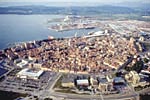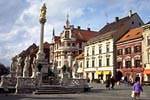If the residents of Slovenia's coastal region Primorska have their way, the universities at Ljubljana and Maribor will soon be joined by a third: Primorska University. But the University of Maribor has ambitions of its own, which are being complicated by the Primorska plan.
The Primorska plan
Primorska has a long tradition in education, but in the past it was centered on Trst (Trieste). After the First World War, Trst became part of Italy and the Slovene population went into sharp decline, helped along by Second World War era fascism.
The development of education in Primorska began in the 1960s with the establishment of the Maritime College at Portorož, which in 1995 became the faculty of maritime studies. Over the course of the past several decades, numerous educational institutions have been established throughout the region and today most residents believe there is a sufficient core around which a full university could grow. Eight years ago, the first working group was established to evaluate the possibility of a third Slovene university, and the process seems to be nearing its culmination in the establishment of Primorska University.
The current plan does not call for a university with all programs such as the one that exists in Ljubljana, rather it would take no less than six pre-existing institutes, for example, the polytechnical college at Nova Gorica, the tourism college and the faculty of maritime studies at Portorož, the branch of the pedagogical faculty at Koper, the planned nursing school at Izola and certain other regional educational institutions, and merge them into a single body.
The project is controversial, and the standard argument of opponents is that European standards call for one university per one million inhabitants. Slovenia already has two universities to match its two million citizens. When the project was getting off the ground, an OECD (Organization for Economic Cooperation and Development) study was undertaken which determined that Slovenia had no need for a third university. A study conducted by the Slovene Scientific Foundation, however, came up with different results. Of the 35 foreign and Slovene experts participating in the study, only five did not support the establishment of a university in the Primorska region.
Gaining momentum?
Experts have been reviewing the situation for more than eight years now, but it seems that this summer the momentum has picked up. In June, the government's Council for Higher Education approved the establishment of a liberal arts faculty in Koper. The faculty would be a key part of Primorska University, if and when it is established. The new faculty will begin accepting students for the 2001-2002 school year.
 |
| Koper |
At the beginning of this month, a bill was introduced into Parliament to allocate resources in the amount of SIT 3.96 billion (USD 16 million) to fund the final preparations. A protest meeting was held on 11 September in Koper to push for the bill and other regional concerns, but this has had little effect. The bill was not passed before the end of the session on 14 September and will have to wait until after the 15 October elections.
Reactions to the project
The University of Ljubljana's rector, Dr Jože Mencinger, has expressed support for the project. According to him, a third university could lessen the strain on student housing in the capital. But in the next breath, Mencinger added he is certain that his university will remain students' first choice. Competition between Ljubljana and Maribor, especially for funds, is already great, and a third university will only exacerbate the problem.
In the past, the University of Maribor's rector, Dr Ludvik Tolpak, has also spoken out in favor of the project. But when the resource allocation bill was introduced earlier this month, he vocally opposed it. Speaking to Delo, Tolpak stressed that the European standard of one university per one million inhabitants precludes a third Slovene university, and also argued that such special legislation regulating education was in violation of the 58th article of the Constitution, concerning university autonomy. Tolpak advised that the plan for Primorska University should follow the example of the University of Maribor, which started as an Institute of Higher Education in 1959 and only was made a university in 1975, 16 years later.
The case of Maribor
On 19 September, the University of Maribor is celebrating its 25th anniversary. From 14 to 18 September, numerous events will mark the anniversary celebration. The grand opening of the newly renovated headquarters of the University, Slomšek Square, will be on 14 September. The building will be home to classrooms, offices, a library and a gallery. Speakers will include the architect who undertook the renovation, Boris Podrecca, Minister of Culture Rudi Šeligo and Prime Minister Andrej Bajuk. Other events will include a meeting of the Danube Rectors' Conference and an international conference on higher education.
The University has its roots in a 140-year tradition dating back to 1859, when Bishop Slomšek moved the seat of his episcopacy from Labotska Dolina in Carinthia to Maribor, and established a Slovene parochial school which later grew into Maribor's first institution of higher education. In the more recent past, an Association of Higher Education Institutions of Maribor was set up in 1961, which was an umbrella organization for schools in the city. In 1975, six of those schools united and became the University. Today, the University has nine faculties and a Health College.
Maribor's conundrum
Rector Tolpak and other experts from Maribor advise caution towards the Primorska plan. Critics from Maribor say that Primorska is not ready for a university and that educational facilities there are not sufficiently prepared to join into a single body. Citing the European standard of 1:1,000,000 and other arguments, they stress that any planned third university should take the same course Maribor did. From the time of the establishment of the Maribor umbrella organization until the proclamation of the university, 19 years had passed.
But the real reason for resistance from Maribor is that the establishment of a third university would take resources away from their own university, Slovenia's second.
University officials at Maribor would like to see the University of Maribor become more fully developed. They are planning to add to the philosophy faculty and establish a new natural sciences and mathematics faculty, which would bring Maribor up to European standards and make it a more of an equal to Ljubljana. The addition of the new faculties would improve employment opportunities for Maribor graduates as well, since the prestige of the University would be enhanced. The plan's supporters also stress the greater opportunities for international cooperation and collaboration that a more developed University of Maribor would have.
The idea of adding two new faculties to the University has broad support, but there is controversy over exactly how this is to be done. The official plan requires that the current pedagogical faculty be cut to make way for the additions. However, there has been strong opposition and some say that there are not even enough professors for the single pedagogical faculty. Resources available to the University are already slim and a third university could make more development at Maribor impossible.

|
The Council for Higher Education approved an initiative to introduce liberal arts, social studies and science courses into the pedagogical faculty, and the initiative was endorsed by Parliament at the end of March. This is a first step towards full faculties of philosophy and natural sciences, but perhaps too small of a step for the University.
The city of Maribor has always suffered from an inferiority complex in the face of the capital, and this could be assuaged should the University grow to challenge the University of Ljubljana. The challenge posed by the proposed Primorska University is perceived as a real threat to both the University of Maribor and to the city itself.
Maribor must forward concrete proposals and lobby hard in Parliament if its expansion plans are not to be squashed by the Primorska plan. Once the elections are over and the new government assumes its duties later this fall, the Primorska project will certainly be on the agenda and Maribor must ensure that its projects are there as well. After that, it is up to Parliament to decide which is more important: creating a new university, or improving one that is already there.
Brian J Požun, 16 September 2000
Photo credit: Government Public Relations and Media Office
Moving on:
- Ljubljana University: Between hopes and anxieties, by Aleš Debeljak
- Second to One, Brian J Požun on Maribor
- Read more articles on Slovenia in the CER archive
- Browse through the CER eBookstore
- Return to CER front page
Sources:
Maribor University
Delo
Dnevnik
Večer




